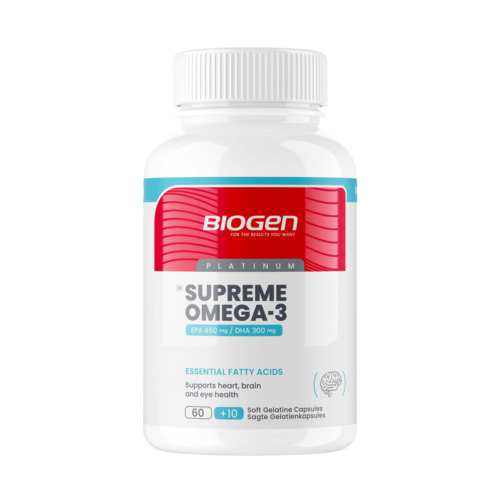
Why Omega-3s Matter for Your Brain, Joints, Recovery, and More
A healthy mind and body are vital to living life with vigour and vitality, with omega-3 essential fatty acids (EFAs) a key nutritional component in improving your overall health.
The omega-3 fatty acids include the long-chain eicosapentaenoic acid (EPA) and docosahexaenoic acid (DHA), which are synthesized from alpha-linolenic acid (ALA)¹.
Omega-3 benefits
While widely renowned for their heart health benefits – a meta-analysis¹ that reviewed data from over 10 studies found omega‐3s helped lower the risk for heart attack and death from coronary heart disease – consuming enough of these essential fats has a positive cascading effect on various aspects of your health, wellbeing and performance.
Omega-3 EFAs play a crucial role in various bodily functions, from brain, heart and eye health to inflammation reduction and skin health.
EPA provides anti-inflammatory activity² while also enhancing the immune system³.
DHA, present in fish oil and some marine algae, is important for the human body’s nervous system, including healthy vision⁴.
Brain function
DHA is a major structural fatty acid in the brain, essential for maintaining normal brain structure⁵.
It also makes up a significant portion of the cell membranes of neurons and contributes to the fluidity and flexibility of these membranes, which is essential for efficient signalling between brain cells⁶.
Research⁷ also confirms that omega-3s “exhibit neuroprotective properties and represent a potential treatment for a variety of neurodegenerative and neurological disorders”.
That means a diet rich in EFAs may help slow the progression of memory loss and cognitive decline by maintaining proper neuronal structure and function.
In fact, higher DHA levels in adults are associated with better memory, learning abilities, and cognitive flexibility⁸.
Tame inflammation
Polyunsaturated fats, especially omega-3s, also help to combat inflammation in the brain⁹.
The role EFAs play in controlling inflammation may also help to support joint health and function and support the body’s natural repair mechanisms.
Their anti-inflammatory properties can interfere with the production of inflammatory molecules like cytokines and prostaglandins, which contribute to joint pain and stiffness in conditions like osteoarthritis¹⁰.
Some research¹¹ suggests that omega-3 fatty acids may help protect and preserve cartilage, the tissue that acts as a cushion between bones in a joint. They might achieve this by reducing the activity of enzymes that break down cartilage, potentially slowing the progression of conditions like osteoarthritis.
Better performance and recovery
These direct benefits to inflammation reduction and management also mean omega-3 fats from our diet and supplements can benefit our training performance and recovery.
By minimising the post-exercise muscle damage, omega-3s may help ease delayed onset muscle soreness (DOMS) and shorten the time needed for muscles to recover after intense training, especially when combined with protein¹².
Some studies also suggest omega-3s can directly improve endurance by acting as vasodilators, potentially increasing oxygen flow to muscles during exercise, which could improve endurance capacity¹³. This benefit might also reduce fatigue during training when you get your intra-workout nutrition right.
Lastly, omega-3s could support muscle strength and growth as research¹⁴ indicates that omega-3s, particularly EPA, may boost muscle protein synthesis, which is crucial for increasing muscle mass and strength.
Getting your omega-3s
Excellent sources of omega-3-rich foods include fatty fish, such as salmon, mackerel, tuna, sardines, and herring, flaxseeds and chia seeds, walnuts, and soybeans and soy products.
You can also supplement your daily intake with a product like Biogen Supreme Omega 3, a high-potency essential fatty acid supplement consisting of a 36:24 ratio of EPA and DHA in the triglyceride form.
Using an omega-3 supplement offers a convenient way to help meet your daily EFA needs, particularly if your dietary intake of omega-3-rich foods like fatty fish, walnuts, and flaxseeds is limited.
These products provide concentrated doses of EPA and DHA, which are crucial to support heart health, brain function, joint health, recovery and reduce inflammation.
References:
- U Y, Hu FB, Manson JE. Marine Omega-3 Supplementation and Cardiovascular Disease: An Updated Meta-Analysis of 13 Randomized Controlled Trials Involving 127 477 Participants. J Am Heart Assoc. 2019 Oct;8(19):e013543. doi: 10.1161/JAHA.119.013543. Epub 2019 Sep 30. PMID: 31567003; PMCID: PMC6806028.
- Crupi R, Cuzzocrea S. Role of EPA in Inflammation: Mechanisms, Effects, and Clinical Relevance. Biomolecules. 2022 Feb 1;12(2):242. doi: 10.3390/biom12020242. PMID: 35204743; PMCID: PMC8961629.
- Gutiérrez S, Svahn SL, Johansson ME. Effects of Omega-3 Fatty Acids on Immune Cells. Int J Mol Sci. 2019 Oct 11;20(20):5028. doi: 10.3390/ijms20205028. PMID: 31614433; PMCID: PMC6834330.
- Guesnet P, Alessandri JM. Docosahexaenoic acid (DHA) and the developing central nervous system (CNS) – Implications for dietary recommendations. Biochimie. 2011 Jan;93(1):7-12. doi: 10.1016/j.biochi.2010.05.005. Epub 2010 May 15. PMID: 20478353.
- Rapoport SI, Ramadan E, Basselin M. Docosahexaenoic acid (DHA) incorporation into the brain from plasma, as an in vivo biomarker of brain DHA metabolism and neurotransmission. Prostaglandins Other Lipid Mediat. 2011 Nov;96(1-4):109-13. doi: 10.1016/j.prostaglandins.2011.06.003. Epub 2011 Jun 15. PMID: 21704722; PMCID: PMC3202024.
- Sinclair AJ. Update on Fatty Acids and the Brain. Nutrients. 2024 Dec 23;16(24):4416. doi: 10.3390/nu16244416. PMID: 39771036; PMCID: PMC11678669.
- Dyall SC. Long-chain omega-3 fatty acids and the brain: a review of the independent and shared effects of EPA, DPA and DHA. Front Aging Neurosci. 2015 Apr 21;7:52. doi: 10.3389/fnagi.2015.00052. PMID: 25954194; PMCID: PMC4404917.
- Weiser MJ, Butt CM, Mohajeri MH. Docosahexaenoic Acid and Cognition throughout the Lifespan. Nutrients. 2016 Feb 17;8(2):99. doi: 10.3390/nu8020099. PMID: 26901223; PMCID: PMC4772061.
- Malau, I.A.; Chang, J.P.-C.; Lin, Y.-W.; Chang, C.-C.; Chiu, W.-C.; Su, K.-P. Omega-3 Fatty Acids and Neuroinflammation in Depression: Targeting Damage-Associated Molecular Patterns and Neural Biomarkers. Cells 2024, 13, 1791. https://doi.org/10.3390/cells13211791.
- Deng W, Yi Z, Yin E, Lu R, You H, Yuan X. Effect of omega-3 polyunsaturated fatty acids supplementation for patients with osteoarthritis: a meta-analysis. J Orthop Surg Res. 2023 May 24;18(1):381. doi: 10.1186/s13018-023-03855-w. PMID: 37226250; PMCID: PMC10210278
- Chen, F., Zhang, Z., Wang, W. et al. Omega-3 fatty acids protect cartilage from acute injurie by reducing the mechanical sensitivity of chondrocytes. J Orthop Surg Res 19, 591 (2024). https://doi.org/10.1186/s13018-024-05081-4.
- Ahmadi, M.; Hoorang, N.; Imanian, B.; Hemmatinafar, M.; Rezaei, R.; Nemati, J.; Eftekhari, F.; Alkasasbeh, W.J. Boosting Recovery: Omega-3 and Whey Protein Enhance Strength and Ease Muscle Soreness in Female Futsal Players. Nutrients 2024, 16, 4263. https://doi.org/10.3390/nu16244263.
- Limbu R, Cottrell GS, McNeish AJ. Characterisation of the vasodilation effects of DHA and EPA, n-3 PUFAs (fish oils), in rat aorta and mesenteric resistance arteries. PLoS One. 2018 Feb 2;13(2):e0192484. doi: 10.1371/journal.pone.0192484. PMID: 29394279; PMCID: PMC5796719.
- McGlory C, Calder PC, Nunes EA. The Influence of Omega-3 Fatty Acids on Skeletal Muscle Protein Turnover in Health, Disuse, and Disease. Front Nutr. 2019 Sep 6;6:144. doi: 10.3389/fnut.2019.00144. PMID: 31555658; PMCID: PMC6742725.











